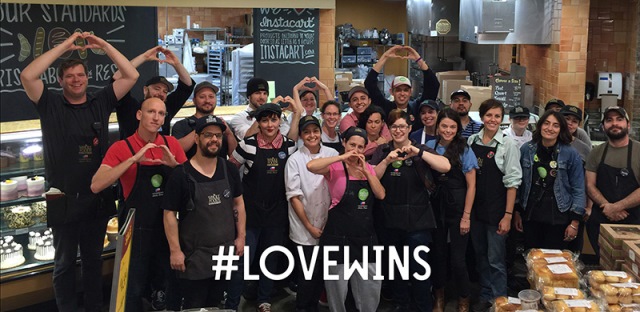PR experts typically recommend against going on the offensive when faced with a PR crisis. Counter-attacking accusers only makes matters worse, they say. Instead, assume a defensive position, quickly apologize, correct the situation and make amends. Sometimes, however, the best defense is a good offense.
Whole Foods chose to take the offense when it was sued by Austin pastor Jordan Brown. Brown ordered a cake at the store and requested that the words “Love Wins” be written on it. Instead, store personnel wrote “Love Wins Fag,” he said. He posted a video about his cake and filed a lawsuit against Whole Foods.
In response, Whole Foods issued a statement saying its surveillance video, which it posted on YouTube as evidence, proves that Brown’s story was a hoax. A photo of its staff in its statement helped humanize its response. Whole Foods didn’t stop there. It filed a counter suit seeking $100,000 for defamation.
What PR Crisis Experts Think
PR experts approved the company’s aggressive strategy and said it could have benefited from aggressive strategies in previous crisis.
“Whole Foods has grown tired of feeling like a target for controversy and bad press, and their new strategy is to fight back,” Julie Irwin, a marketing professor at the University of Texas’ McCombs School of Business, told the American Statesman. Natural food stores and most other companies are vulnerable to wild accusations about their positions on social issues such as gay marriage. A cake with a homophobic slur impacts their target market.
“Threats to reputation are constant today. This is thanks in large part to the Internet and social media, which allow even a single voice to spread their story to many,” added Erik Bernstein, vice president at California firm Bernstein Crisis Management. “Outrage is in, and both businesses and prominent individuals are feeling the result.”
A Step too Far?
Crisis management expert Melissa Agnes, president of Agnes + Day, says the Whole Foods rebuttal and video post was an excellent crisis management response but the retailer’s counter lawsuit went too far. “Had they published their statement, video and picture and left it at that, the issue would have been managed and the story would soon be forgotten,” Agnes blogs. “Now, however, whenever there is an update on the countersuit, the story will be brought back up and published about.”
The time for an offensive crisis management is when you absolutely need to: when your brand faces irreparable or long-term damage, Agnes says. It’s important to reach the decision only after much thought and avoid appearing as a corporate bully. More often than not, a positive approach is preferable.
Bottom Line: The aggressive crisis response by Whole Foods to an allegation involving an anti-gay slur drew applause from many PR crisis experts. Its strategy also raises questions over when going on the offensive is the most appropriate crisis management tactic – and how far is too far in mounting a PR counterattack.
Do you support the Whole Foods crisis management tactics? Please comment below.
William J. Comcowich founded and served as CEO of CyberAlert LLC, the predecessor of Glean.info. He is currently serving as Interim CEO and member of the Board of Directors. Glean.info provides customized media monitoring, media measurement and analytics solutions across all types of traditional and social media.





